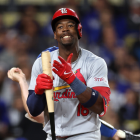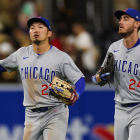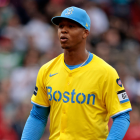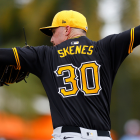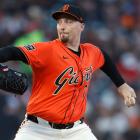Leading up to the announcement of the 2017 Baseball Hall of Fame class on Jan. 18, we're examining each of the 34 candidates on this year's BBWAA ballot. By way of reminder, a candidate must be named on at least 75 percent of submitted BBWAA ballots in order to be elected into the Hall of Fame.
We've already looked at the numerous candidates who are certain to fall off the ballot after only one year (candidates receiving less than five percent drop off the ballot). Now we're looking at those hopefuls who figure to have meaningful support and perhaps even earn induction at some point. Up this time around is the peerless Barry Bonds.
Bonds, who played 22 years from 1986-2007, broke in with the Pirates before spending most of his career with the Giants. His resume is unmatched. Bonds is on the very short list of the best players in history, and there is zero statistical case to be made against his Hall of Fame candidacy. None whatsoever. To the career numbers:
Batting average: .298 (230th all-time)
On-base percentage: .444 (6th)
Slugging percentage: .607 (5th)
OPS: 1.051 (4th)
OPS+: 182 (3rd)
Hits: 2,935 (35th)
Walks: 2,558 (1st)
Home runs: 762 (1st)
Runs batted in: 1,996 (5th)
Runs scored: 2,227 (3rd)
Extra-base hits: 1,440 (2nd to Hank Aaron)
Times on base: 5,599 (2nd to Pete Rose)
Total bases: 5,976 (4th)
Stolen bases: 514 (33rd)
Wins above replacement: 162.4 (2nd to Babe Ruth)
In addition to being baseball's all-time home run king, Bonds also set the single season home run record with 73 back in 2001. He averaged one home run every 2.1 games that season. Here is the record-breaking home run:
It's difficult to identify Bonds' peak because his entire career was his peak, basically. From 1990-2007, he never once dropped below a 156 OPS+ in a single season. For reference, Kris Bryant had a 149 OPS+ in 2016, which earned him the NL MVP award.
By OPS, Bonds' worst season from 1990-2007 was 1991, when he hit .292/.410/.514 with 25 homers and 43 steals. The .349/.559/.809 (256 OPS+) batting line he authored from 2001-04 is truly unbelievable. No one pitched to him -- Bonds drew a record 120 intentional walks in 2004 -- and still hit .359 with huge power for four seasons.
Bonds went to 14 All-Star Games and won a record seven MVP awards (1990, 1992-93, 2001-04). He also finished second in the MVP voting on two other occasions (1991, 2000). Add in eight Gold Glove awards and 12 Silver Sluggers, and you have one of the most decorated careers in baseball history. You name it and Bonds did it.
Like I said, there is no statistical argument to be made against Bonds as a Hall of Famer. He's one of the two or three greatest players in history, and he belongs in the inner circle of the inner circle of the Hall of Fame. And yet, Bonds is on the ballot for the fifth time, and he did not receive more than 44.3 percent of the vote in any of his first four years on the ballot.
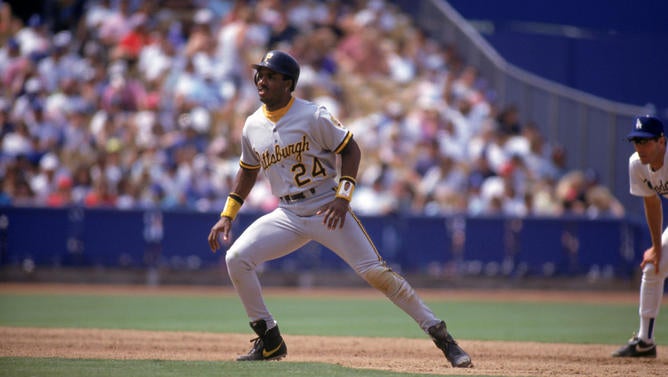
The reason, as you know, is performance-enhancing drugs, even though Bonds never failed a test or served a suspension. He was investigated by a grand jury as part of the early-2000s BALCO scandal, which led to an indictment in 2007 for obstruction of justice for "giving an evasive answer to a question under oath." Bonds was convicted in 2011, but the conviction was overturned by an appeals court in 2015.
Furthermore, Bonds was featured in the book Game of Shadows, which included leaked grand jury testimony. (The testimony was supposed to remain sealed and confidential.) During the testimony, Bonds admitted to using a cream and a clear substance provided by his personal trainer, though he said he was told it was a nutritional flaxseed oil supplement for arthritis. Game of Shadows also alleged Bonds used the banned substance stanozolol and other PEDs. He also appeared in the Mitchell Report.
There is no hard evidence Bonds used PEDs, such as a failed test, but let's not kid ourselves here. There are plenty of reasons to be suspicious. Enough that he's now on the Hall of Fame ballot for the fifth year and has yet to received even 50 percent of the vote despite what very well might have been the greatest playing career of our lifetimes.
According to Ryan Thibodaux's tracker, Bonds has gained quite a bit of support this year, appeared on 67.2 percent of the public ballots as of this writing. Here is where Bonds sat in previous years:
| Public Ballot Voting% | Public Ballots Known% | Final Voting% | |
| 2013 | 47.9% | 29.3% | 36.2% |
| 2014 | 41.1% | 52.9% | 34.7% |
| 2015 | 39.3% | 60.3% | 36.8% |
| 2016 | 45.5% | 70.5% | 44.3% |
In each of his four years on the ballot, Bonds has always performed better with the public ballots than the non-public ballots. Slightly more than 40 percent of this year's Hall of Fame ballots are known at the moment, so there's still 60 percent or so out there. History suggests the remaining 60 percent will drag Bonds' voting percentage down.
Still, Bonds is receiving more support than ever before on the public ballots, which could bode well going forward. Remember, the Hall of Fame voting body is changing. Veteran voters who have not covered baseball in a decade are losing their vote while a new batch of younger voters are gaining votes. The new voters seem more willing to overlook the PED suspicions given Bonds' overwhelming greatness.
Bonds almost certainly won't be elected in to the Hall of Fame this year. He still has another five years on the ballot though, and if he keeps gaining up support each year, he very well might find himself in Cooperstown at some point in the next half-decade. Things seem to be looking up for Bonds.
Other Hall of Fame cases: Posada | Ramirez | Guerrero | Rodriguez | Sosa | Wagner | Walker | Kent | McGriff | Smith | Mussina | Martinez
















